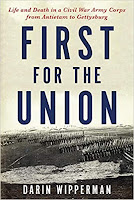New Arrival:
• First for the Union: Life and Death in a Civil War Army Corps from Antietam to Gettysburg by Darin Wipperman (Stackpole Bks, 2020).
From the description: "The Army of the Potomac’s First Corps was one of the best corps in the entire Union army. In September 1862, it was chosen to spearhead the Union attack at Antietam, fighting Stonewall Jackson’s men in the Cornfield and at the Dunker Church. In July 1863 at Gettysburg, its men were the first Union infantry to reach the battle, where they relieved the cavalry and fought off the Confederate onslaught all day before retreating to Cemetery Hill. Their valiant stand west of Gettysburg saved the Union from disaster that day but came at great cost (60 percent casualties). The corps was disbanded the following spring, having bled itself out of existence."
In addition to its distinguished combat record, the famous units that were a part of it and the high command stature of several generals who passed through it all contribute to the corps's lofty historical reputation. More from the description: "The First Corps’ leadership included two generals who would rise to command the Army of the Potomac—Joseph Hooker and George Meade—and a third who refused that command, John Reynolds, often considered the best commander in the East until his death at Gettysburg. The corps was made up heavily of men from New York and Pennsylvania (including the famous Bucktails), with a handful of New England regiments and the Midwesterners of the Iron Brigade, perhaps the Civil War’s most famous Union brigade."
This is the kind of book topic that typically goes into my "maybe" reading pile, but a glance through the introduction section can often sway things in one direction or the other. In his introduction to First for the Union: Life and Death in a Civil War Army Corps from Antietam to Gettysburg, author Darin Wipperman isn't shy about unpopularly declaring General Reynolds "overrated." I happen to agree with that assessment, not because I don't believe he was a good general but rather because I feel his war record (always a combination of actual performance and quality of opportunities to perform) doesn't merit the gushing ratings he so often receives from writers as the Army of the Potomac's best general. Wipperman also claims that some of his reinterpretations of events "could leave some students of the war wondering if my analysis has plunged off the deep end" (pg. xvii). We all know that books employing that brand of enticement often don't turn out well, but that tease might be too hard to pass up!



Does the author explain why his narrative starts with Antietam? The First Corps (under a different name) existed for several months before then.
ReplyDeleteI don't know yet.
DeleteTo be technically correct, it was originally the I Corps under McDowell; had an infusion of units during its existence as well as the (temporary) loss of McCall's division; and operated more or less independently. It then became III Corps of the Army of Virginia for a relatively brief time, during which it again had a return of most of what had been McCall's. It only became a "stable" organization in the Army of the Potomac in September 1862. While I'd be interested in the author's explanation, I think the demarcation point makes a lot of sense.
ReplyDelete